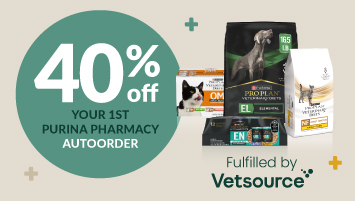Product details
Minocycline is a broad-spectrum tetracycline antibiotic used to treat a wide range of bacterial infections in animals.
This product is a standard capsule formulation.
-
Used to treat a variety of susceptible bacterial infections in small animals, including respiratory tract infections and tick-borne diseases (e.g., Lyme disease).
-
Can also be used to treat susceptible bacterial infections and tick-borne diseases in horses.
-
Avoid dry pilling, especially in cats and other small animals; always try to administer with a moist treat and/or a small amount of liquid.
-
May be prescribed for other animal species; please consult your veterinarian.
-
While this drug does not have an FDA-approved indication for all animal uses, it is commonly accepted for veterinarians to prescribe this medication for use in animals.
*Please note: This is a generic medication. Product packaging and appearance, including size, color, and shape, may differ from the description or images provided and are subject to manufacturer availability.
Product sourced directly from the manufacturer or their approved distributor. Guaranteed genuine product backed by the manufacturer.
For
Dogs, Cats, and Horses
Active ingredient(s)
Minocycline hydrochloride
Common brand names
Minocin
Drug class
Tetracycline antibiotic
Product strength & size
Minocycline capsules may be available in multiple strengths and/or sizes. Please ensure the selected product and package size are appropriate for your pet, as recommended by your veterinarian.
For current availability, please refer to the product selection above.
Usage
Minocycline Capsules should be given orally as directed by your veterinarian. Please consult your veterinarian before making any changes or discontinuing the prescribed dosing schedule.
Avoid dry pilling this medication, especially in cats and other small animals, as the pill may become lodged and damage the throat and/or esophagus.
When given orally, this medication works best when given on an empty stomach (not with a full meal). Give with a moist treat or a small amount of liquid (at least 6 mL of water is recommended). Please notify and discuss treatment options with your veterinarian if your pet has difficulty swallowing this medication.
If your pet vomits or appears unwell after receiving a dose on an empty stomach, give future doses with a small amount of additional food or a treat. If vomiting continues, contact your veterinarian.
Administer the complete course of the medication as prescribed, even if your pet's condition has improved. Failure to administer the entire course of treatment may cause recurrence or worsening of the infection. Contact your veterinarian ahead of time if your pet needs a refill.
Missed doses
Administer the dose as soon as possible. If it is almost time for the next dose, skip the missed dose and continue with the regular schedule. Do not give two doses at once.
Storage
Store in a cool, dry place at a controlled room temperature (68 to 77°F, brief excursions permitted between 59 and 86°F). Protect from light. Keep in a tight, light-resistant container and out of the reach of children and pets. Store away from heat and direct sunlight. Do not store in the bathroom, near the kitchen sink, or in damp places. The medicine may break down if exposed to heat or moisture.
Side effects
The most common side effects of this medication are nausea, vomiting, diarrhea, and decreased appetite.
Minocycline may increase sensitivity to the sun. Sunburn may be more likely to occur in hairless areas including the nose, eyelids, and ears. Prolonged or direct sun exposure should be avoided while taking this medication.
Contact your veterinarian immediately if your pet has severe or bloody stool or vomiting; complete loss of appetite; difficulty swallowing; decreased energy level/weakness; seizures; bleeding; extreme behavioral changes; or yellowing of the skin, whites of the eyes, and/or gums.
Notify your veterinarian if your pet experiences any of the effects described above, or if you notice any other side effects that are persistent or troublesome.
If you notice anything unusual, please consult your veterinarian.
Precautions
Do NOT dry pill this medication; capsules should be administered with a small amount of moist food and/or liquid (at least 6 mL of water is recommended for cats).
This medication should generally be avoided in pregnant or nursing animals unless the benefits to the mother outweigh the risks to the offspring. Discuss the risks of using this medication with your veterinarian if your pet is in one of these groups.
Use with caution in young animals that still have developing bones and teeth (younger than 6 months of age), as well as animals with difficulty swallowing, severe kidney impairment/failure, or preexisting liver impairment/disease.
Long-term usage is not generally recommended, as an overgrowth of certain bacteria or fungi not susceptible to minocycline (superinfection) can occur.
Do not administer to animals with a known history or suspected allergy/hypersensitivity to any tetracycline antibiotic, including this medication or any of its ingredients. Allergic reactions to medications may occur. Be sure to inform Vetsource and your veterinarian if your pet has any known drug sensitivities or allergies.
If your pet displays symptoms of an allergic reaction, discontinue therapy and call your veterinarian immediately or seek emergency veterinary attention. Symptoms may include (but are not limited to): swollen lips, tongue, face, or airways; difficulty breathing; agitation; profuse salivation; and widespread hives or itching.
Drug and food interactions
Minocycline should be given at least 2 hours before or after antacids, antidiarrheals, multivitamins, oral iron supplements, and/or sucralfate to ensure proper absorption.
The following drugs* may have potential interactions with this medication: antacids (containing aluminum, calcium, and/or magnesium), antidiarrheals (e.g., bismuth subsalicylate, kaolin/pectin), oral iron supplements, digoxin, diuretics (e.g., furosemide, torsemide, spironolactone), methotrexate, insulins, sucralfate, and warfarin.
*NOTE: this may not be a comprehensive list. Contact your veterinarian if your pet experiences any unusual reactions when different medications are given together.
Please ensure your veterinarian is aware of all medications and supplements that your pet is currently receiving. Your veterinarian may prescribe multiple medications, even if a potential drug interaction may occur. In these instances, your veterinarian may adjust the dosages or monitor your pet more closely.
Adverse reactions
If you are concerned that your pet has experienced an adverse reaction to this medication, please contact Vetsource Pet Owner Care at 877-738-4443.
Overdose
If you have any reason to suspect an overdose, call your doctor/veterinarian or the appropriate poison control resource immediately.
For humans:
The national toll-free Poison Help line, 1-800-222-1222, will connect you to your local poison center in case of emergency. This service is available nationwide and in most U.S. territories.
For animals:
The ASPCA Animal Poison Control Center is available 24 hours a day, 365 days a year at 888-426-4435.
Pet Poison Helpline® also provides a 24/7 animal poison control service at 855-764-7661.
*Please note: this information is for third-party services and is provided for convenience in case of potential poison-related emergencies. There may be consultation fee for these services.
Disclaimer
The content provided on this page is NOT medical advice.
All content, including the images and product description above, is intended for general informational purposes only and should not be considered a substitute for professional veterinary consultation, diagnosis, or treatment.
Consult your veterinarian for complete information about this product and how it fits into your pet's individual treatment plan.
Last revised: 7/08/2025



















